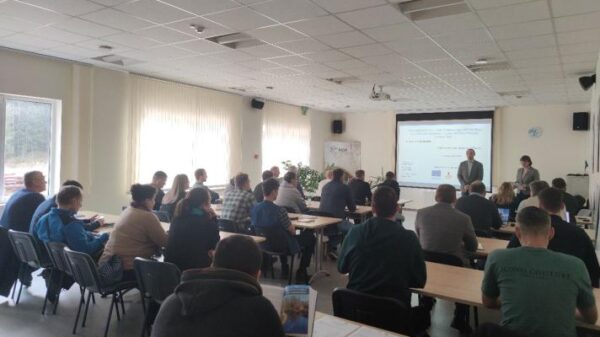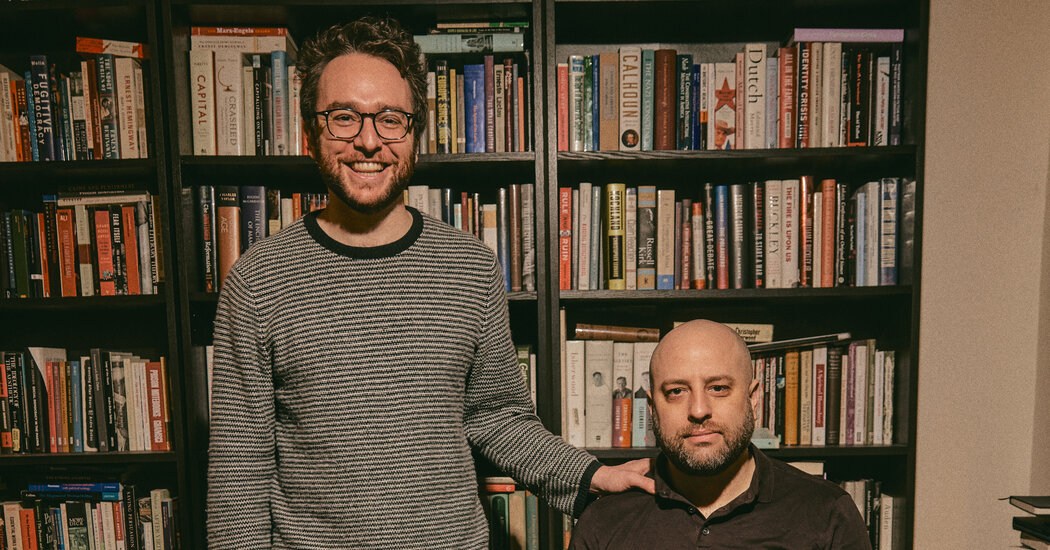The podcast hosted by Matthew Sitman and Sam Adler-Bell offers history lessons that middle-aged liberals, young socialists and even some conservatives can love.
When Matthew Sitman and Sam Adler-Bell sat down in the spring of 2019 to start the podcast “Know Your Enemy,” all they had was a microphone, a cheeky title and the vague hope that “yet another podcast where two leftist bros guide you through the swampy morass of the American right,” as they put it, might be something other people would actually listen to.
“We had no idea what we were doing,” Adler-Bell, 31, said during an interview last month in Sitman’s apartment in Manhattan, groaning at the mention of that first episode, which featured plenty of awkward fumbling and jokes about Sitman’s Leo Strauss tattoos.
Sitman, 40, a self-described “recovered conservative” (with no tattoos), offered a somewhat more charitable take.
“We just love talking to each other,” he said.
Nearly three years and 100 episodes later, “Know Your Enemy” has moved from being a cult favorite to something of a must-listen for the sort of person who is as interested in the internal politics of National Review, circa 1957, as in the current jousting on Capitol Hill.
The podcast contextualizes today’s hot-button debates like the battles over critical race theory in schools. But it mostly offers deep dives into conservative intellectual history, going into the weeds of the weeds armed with reading lists, reams of footnotes and archival documents.
Its audience of roughly 25,000 to 50,000 listeners per episode (according to the hosts) may be tiny by the standards of Joe Rogan, or even the socialist podcast “Chapo Trap House.” But in our hyper-polarized times, “Know Your Enemy” has emerged as something middle-aged liberals, young democratic socialists and Gen Z conservatives hungry for deeper perspective on the tumult of the Trump era can all love.
“They really do their homework,” said Nate Hochman, a 23-year-old writer for National Review who described himself as fan “before it was cool.” “They’ve read more conservative political theory than most conservatives.”
While “enemy” may give the title its juice, the operative word is “know” — and, possibly, emulate?
Young progressives “don’t understand why the right keeps winning,” said Sam Tanenhaus, a former editor of The New York Times Book Review who is working on a biography of William F. Buckley.
“What Sam and Matt say is, look at it a different way,” Tanenhaus continued. “Don’t just see the right as the enemy, pure and simple. See them as brilliant — and maybe smarter than you are.”
The podcast began at a fortuitous moment in 2019. Early salvos in the fractious (and hard-to-decipher) debate between the conservative writers David French and Sohrab Ahmari had started lighting up the conservative pundit-sphere, and the first National Conservatism Conference, where a Who’s Who of the right tried to hash out an ideologically coherent version of Trumpism, was just a few months away.
“By that point, most of the magazines and think-tanks and funders on the right had started making the Trump pivot,” said Sitman, who is leaving his job at the liberal Roman Catholic magazine Commonweal later this month to write and podcast full time. “As the dust was settling, you could see where things were at.”
A few months in, the democratic socialist magazine Dissent became sponsors, as listenership steadily grew. (The podcast currently takes in about $17,000 month from subscribers, who sign up for tiers, ranging from “Young American for Freedom” to “Unreconstructed Monarchist.”) The “breakthrough,” Sitman said, came in January 2021, with an episode on the roiling debate over whether President Trump is a fascist.
The Jan. 6 insurrection, Sitman said, felt “very vindicating” of “the penchant for authoritarian minority rule” on the right, which the podcast had been noting from the beginning.
The (relative) calm of the first year of the Biden presidency created more room for scholarly explorations, like episodes on the friendship between Allan Bloom and Saul Bellow, and on Frank Meyer, the ex-Communist National Review editor and creator of “fusionism,” the marriage of free-market economics and social traditionalism that defined postwar conservatism.
And in a particularly head-snapping installment, the hosts, joined by Tanenhaus, examined the conservatism of Joan Didion, who contributed regularly to National Review early in her career (and who in 2001 wrote that she would have voted for Barry Goldwater in every election after 1964, if she’d had the chance).
Those biographical dives explore favorite “Know Your Enemy” themes of mentorship and friendship, conversions and trajectories, with a rich sense of psychology and literary surprise. Sitman likes to quote a former professor: “The relationship between gossip and philosophy is tenuous but real.”
As for his own trajectory, Sitman grew up in a working-class, fundamentalist Baptist family in central Pennsylvania, steeped in “God and guns conservatism,” as he put it in a 2016 essay. He graduated from a small Christian college, and after an internship at the Heritage Foundation, enrolled in graduate school at Georgetown, studying political theory with the conservative scholar George W. Carey.
What peeled him away from conservatism, starting in his mid-20s, he said, was disgust at conservatives’ support for torture, as well as growing embrace of class politics, which pulled him toward democratic socialism.
He converted to Catholicism in 2015. His faith, and the way he sees human vulnerability as central to politics, is a touchstone on the podcast.
“I feel guilty about making Sam learn so much about the Catholic Church,” Sitman said. Adler-Bell shot back: “I’m going to make you read Freud at some point.”
Adler-Bell, grew up in a progressive, secular Jewish family in Connecticut. He was active in a student-labor alliance while an undergraduate at Brown, and later worked at the advocacy group Demand Progress and interned at The Nation.
He said his immersion in conservative thought “defamiliarized the left,” forcing him to think harder about why he believed what he believed.
“A lot of people on the left only come into contact with the stupidest versions of right-wing arguments — the least sophisticated, the least interesting, the least literary,” he said.
On the podcast, and in person, Sitman has a genial professorial vibe, spiking his learned explications with anecdotes about prominent figures, some of whom he knew personally. Adler-Bell is saltier, always eager, as he half-jokingly puts it, to highlight the more “lurid and prurient” aspects of the right.
Sitman said the podcast has damaged some “already frayed” relationships with former mentors and friends. But he emphasized that, unlike some other apostates from the right, he wasn’t “embittered.”
“I am!” Adler-Bell interjected, slapping his knee. “That’s why it’s good to have me, an argumentative Jew.”
Not all conservative listeners are unqualified fans. Matthew Schmitz, 34, a columnist at The American Conservative and former senior editor at First Things, said Sitman and Adler-Bell were “extremely good at their jobs,” calling the podcast “better than almost anything on public radio.” That wasn’t entirely a compliment.
“‘Know Your Enemy’ falls into a kind of ideological orientalism, presenting right-wing ideas as a mélange of the backward, regressive and decadent,” he said.
Which brings up a still-unsettled question for the hosts: How much to talk with conservatives, as opposed to just talking about them?
So far, only a handful of “enemies” have appeared as guests, including Ross Douthat, an opinion columnist for The Times. All the conservative guests are “a little bit heterodox,” Sitman conceded. Adler-Bell added: “We have a ‘no hacks’ policy.”
Still, after an episode with Hochman (one of the young conservative radicals featured in a much-discussed recent article by Adler-Bell in The New Republic), some listeners wrote in with concerns the hosts had “platformed” him without pushing back hard enough.
The hosts say they thought they were tough, pressing him, for example, on the role of white racial backlash in fueling postwar conservatism. “We trust the intelligence of our listeners,” Sitman said. But they also acknowledged that, “as two white guys,” they are less likely to experience some things conservatives say as “deeply offensive or dehumanizing.”
Their goal isn’t any squishy mutual understanding or bipartisan compromise, but clarification — and the sheer pleasure of conversation. “It’s great to have a chance to talk to people you disagree with, without thinking the project is to find common ground,” Adler- Bell said.
Sitman, again hitting the more professorial note, paraphrased the British philosopher Michael Oakeshott, from his essay “On Being Conservative.”
“The point of going fishing isn’t to catch fish,” he said. “It’s to be out on the water.”


























